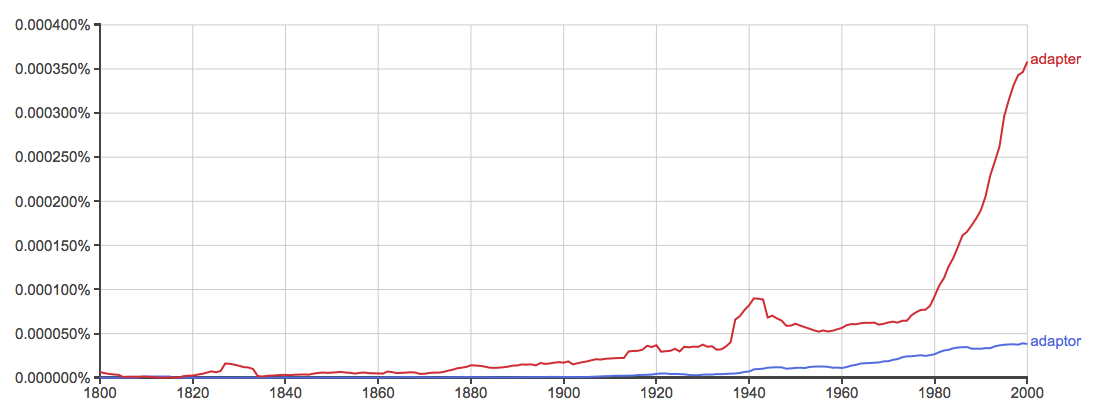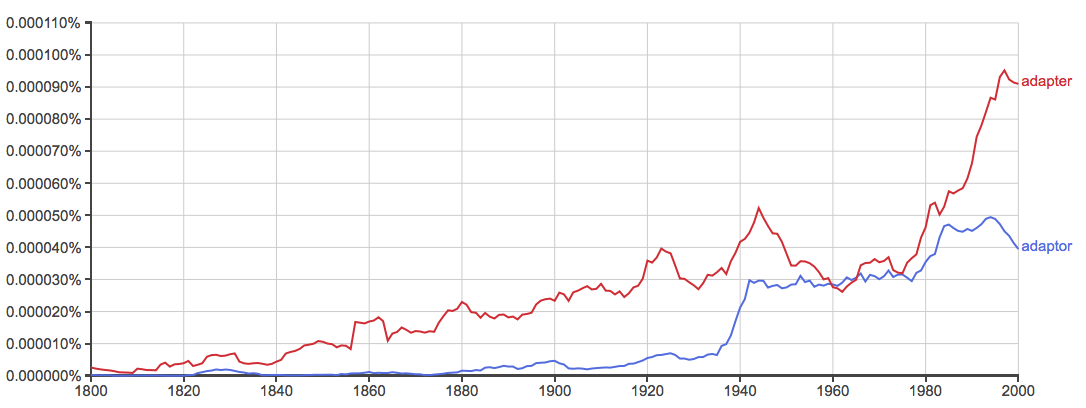The English language is full of confusing words that trip up native and nonnative writers alike. Today’s two words are no exception.
How exactly do you use adapter or adaptor?
What is the Difference Between Adapter and Adaptor?
Unfortunately, there isn’t a clear-cut or universally observed distinction. That would be nice, but language is rarely so kind to us.
In this post, I will outline the differences between adapter vs. adaptor, and after reading it, you won’t ever again second-guess yourself when using them.
Uses of Adapter and Adaptor
These words have two primary meanings.
The first definition refers to a device for connecting pieces of equipment that cannot be connected directly.
- I need a power adaptor to charge my laptop.
- Most power adapters do feel quite warm to the touch, especially if you have the laptop turned on and are working as you recharge. This is normal. –The New York Times
The second definition refers to a person who adapts something, e.g., a person who adapts a text to make it suitable for film, broadcasting, or the stage.
- The screenplay adapter thinks the script needs some work.
- The plays were a very different story: I worked with the adaptor for 10 drafts. –The Washington Post
But, which spelling do you use and when? If you notice, I used both spelling for both definitions above.
Possible Distinctions
Some people claim there is a regional difference between these two words: that adapter is used in American English and adaptor in British English (and some people claim the opposite).
If you look at the below graph of American English usage, you can see that adapter is used with much greater frequency than adaptor.

But, if we look at British English usage, we see that adapter is also used more frequently than adaptor, albeit not to quite the same degree as American English.

This shows that both regions, on the whole, use the spelling adapter with greater frequency.
This doesn’t show us how each word is being used (device or person), but it does prove wrong the idea that adapter is the American form and adaptor is the British form.
Instead of a regional difference, others have tried to distinguish these words by their meaning.
Some people claim that an adapter is used only when referring to a person, while adaptor is used only when referring to electronic or other mechanical devices.
Even further, some claim that a device can be an adapter or adaptor, but a person can only be an adapter.
Fowler’s Modern Usage Guide says while such a distinction would be useful, it’s not widely observed. They go on to say that the spelling adapter is three times more common for both meanings.
What’s the Bottom Line?
 Both words are used interchangeably in all contexts and in all varieties of English throughout the world.
Both words are used interchangeably in all contexts and in all varieties of English throughout the world.
If you want to play it safe in your writing, use adapter in all cases. As Fowler’s notes, that is the most common spelling for both meanings all throughout the English-speaking world. Sticking to this spelling is the best way to keep your audience’s attention on your message, rather than your word choice.
Still, some writers opt to observe a distinction between the spellings. The British newspaper The Guardian, for instance, makes a distinction between adaptor vs. adapter in its internal style guide, namely, use adaptor when referring to devices and adapter when referring to people.
This, of course, isn’t necessary; it’s simply a preference. If you want to draw a distinction in your own writing for greater clarity, you can. If you want to keep it simple, use adapter for both meanings.
Summary
Should you use adaptor or adapter?
Both words can be used interchangeably. Adapter is the more common spelling for either meaning of the word.
Contents
